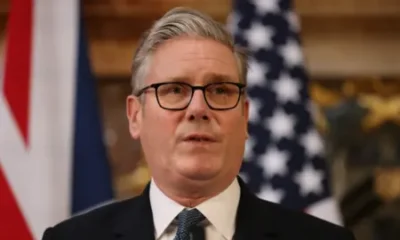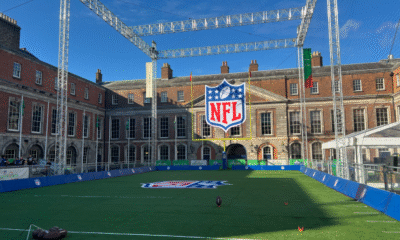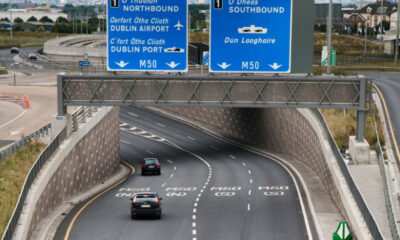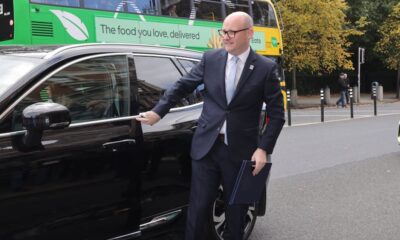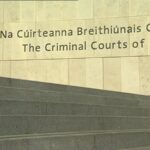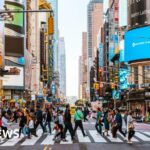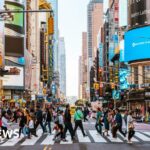Business
BBC partly upholds complaints over Bob Vylan Glastonbury set

Read full article on post.
Ian YoungsCulture reporter and
Emma SaundersCulture reporter
The BBC’s broadcast of Bob Vylan’s controversial set at Glastonbury broke editorial guidelines in relation to harm and offence, the corporation’s complaints unit has ruled.
However, it has been cleared of breaching the BBC’s rules on impartiality and being likely to encourage or incite crime.
The punk duo led a chant of “death, death to the IDF [Israel Defence Forces]” and made other derogatory comments during their performance, which was available to watch via a live stream on iPlayer.
The ruling comes after the BBC’s Executive Complaints Unit (ECU) examined four complaints, which have been partly upheld.
The ECU said the band’s performance broke harm and offence guidelines because of their chants against the IDF, their uses of the slogans “From the river to the sea” and “Free, free Palestine”, and their references to a record company boss “in the most abusive terms”, using offensive language referring to “Zionists”.
The latter segment was in breach of guidance that prohibits “unduly intimidating, humiliating, intrusive, aggressive or derogatory remarks aimed at real people”, the ruling said.
Antisemitic comments
The comments, “taken in the round”, could “fairly be characterised as antisemitic”, the ruling said.
The ECU did not decide that the performance breached guidelines likely to encourage or incite crime, however.
The ruling said: “References to ‘Free Palestine’ and ‘From the river to the sea’, while viewed by some as implying the disappearance of the state of Israel, can also be regarded as no more than expressions of support for aspirations to a Palestinian state and do not of themselves threaten violent action.”
While it said the chant of “Death, death to the IDF” was “clearly more problematic… it is directed at an institution rather than individuals, and one which is not defined by ethnic or religious composition”, the ECU ruled.
On the question of impartiality, the ECU took the view that coverage of a music festival does not have to meet the same standards as a news or current affairs programme.
“While recognising there is widespread disagreement with the political views expressed by Bob Vylan on this occasion, the ECU did not consider they represented a breach of the BBC’s standards of impartiality in this context,” it said.
‘Error of judgement’
The BBC’s handling of Bob Vylan’s festival set, which was streamed on iPlayer, sparked strong criticism after the event in June.
The corporation has already admitted that errors were made both before and during the group’s appearance.
The band were deemed “high risk”, so the feed was monitored and warnings appeared on screen, but the broadcast was not stopped after they made the comments in question.
BBC chairman Samir Shah has said the decision not to pull the live feed was “unquestionably an error of judgement”.
As a result, a small number of senior staff stepped back from their day-to-day duties on music and live events, and the BBC announced a series of changes to the way it streams music performances.
Avon and Somerset Police launched an investigation into the band’s comments.
After the festival, Bob Vylan said in a statement: “We are not for the death of Jews, Arabs or any other race or group of people. We are for the dismantling of a violent military machine”.
Business
US economic growth revised up on strong consumer spending
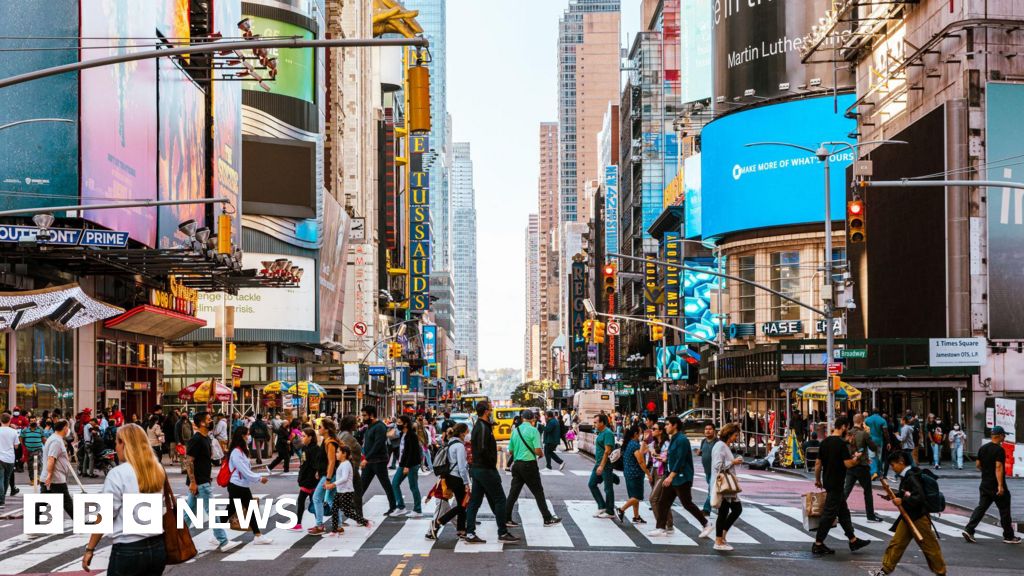
Read more on post.
The US economy grew faster than previously thought this spring, fuelled by robust consumer spending and falling imports, according to new government data.
Gross domestic product (GDP), which measures goods and services production, rose at an annualised rate of 3.8% in the period from April through June – up from the previous estimate of 3.3%.
The second quarter growth – the fastest pace in nearly two years – followed a contraction earlier this year.
Economists said the US economy was doing reasonably well but some uncertainties remain.
Consumer spending rose by 2.5% in the year to the end of June, up from a previous estimate of 1.6%.
In the first three months of 2025, the US economy shrank at a rate of 0.6% as companies rushed in imports to get ahead of US President Donald Trump’s tariffs, which chipped away at GDP.
American consumers, the engine of the world’s largest economy, have remained resilient in the face of tariffs and economic uncertainty.
Retail sales rose 0.6% in August from the prior month, beating expectations, according to data from the Commerce Department released last week.
The continued strength in spending, which has defied worries about a slowdown, is in contrast to recent data showing a weakening labour market.
Employers added just 22,000 jobs in August, fewer than expected, while the unemployment rate ticked up from 4.2% to 4.3%, according to the Labor Department.
But initial claims for unemployment insurance fell last week to their lowest level since July, the Labor Market said on Thursday, in a sign that the jobs market might not be in as dire shape as other data have suggested.
“The latest economic data are considerably more upbeat than the droopy August jobs report,” said Bill Adams, chief economist for Comerica Bank.
“The latest GDP and jobless claims data should ease the bout of anxiety kicked off by the weak August jobs report.”
Economic momentum remained steady in the first half of the year despite mounting policy headwinds, said Lydia Boussour, senior economist at EY-Parthenon.
But she cautioned that “with the impact of tariffs and policy uncertainty becoming increasingly visible, slower US growth and higher inflation are still on the horizon.”
Business
US economic growth revised up on strong consumer spending
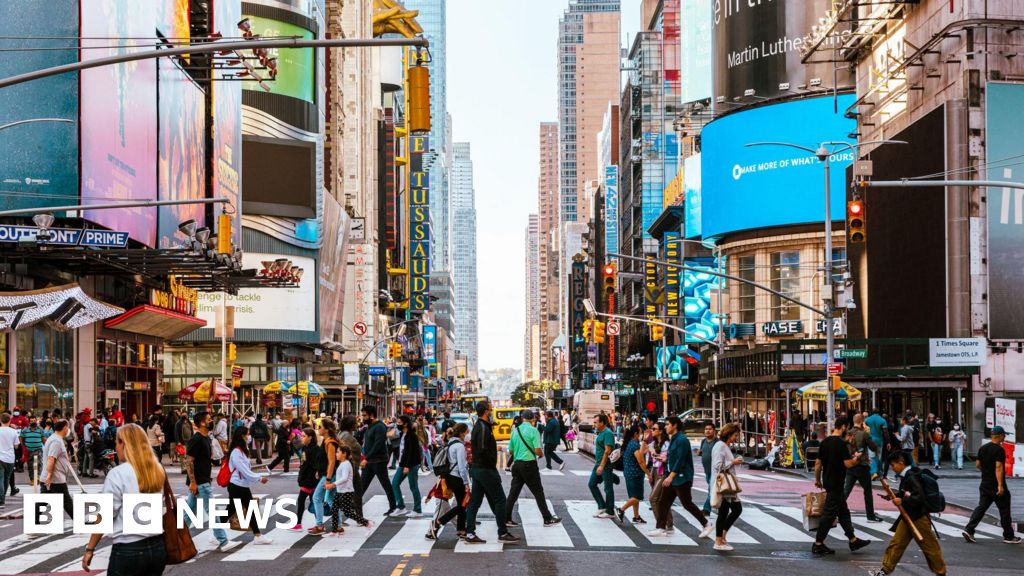
Read more on post.
The US economy grew faster than previously thought this spring, fuelled by robust consumer spending and falling imports, according to new government data.
Gross domestic product (GDP), which measures goods and services production, rose at an annualised rate of 3.8% in the period from April through June – up from the previous estimate of 3.3%.
The second quarter growth – the fastest pace in nearly two years – followed a contraction earlier this year.
Economists said the US economy was doing reasonably well but some uncertainties remain.
Consumer spending rose by 2.5% in the year to the end of June, up from a previous estimate of 1.6%.
In the first three months of 2025, the US economy shrank at a rate of 0.6% as companies rushed in imports to get ahead of US President Donald Trump’s tariffs, which chipped away at GDP.
American consumers, the engine of the world’s largest economy, have remained resilient in the face of tariffs and economic uncertainty.
Retail sales rose 0.6% in August from the prior month, beating expectations, according to data from the Commerce Department released last week.
The continued strength in spending, which has defied worries about a slowdown, is in contrast to recent data showing a weakening labour market.
Employers added just 22,000 jobs in August, fewer than expected, while the unemployment rate ticked up from 4.2% to 4.3%, according to the Labor Department.
But initial claims for unemployment insurance fell last week to their lowest level since July, the Labor Market said on Thursday, in a sign that the jobs market might not be in as dire shape as other data have suggested.
“The latest economic data are considerably more upbeat than the droopy August jobs report,” said Bill Adams, chief economist for Comerica Bank.
“The latest GDP and jobless claims data should ease the bout of anxiety kicked off by the weak August jobs report.”
Economic momentum remained steady in the first half of the year despite mounting policy headwinds, said Lydia Boussour, senior economist at EY-Parthenon.
But she cautioned that “with the impact of tariffs and policy uncertainty becoming increasingly visible, slower US growth and higher inflation are still on the horizon.”
Business
Digital ID to be compulsory for all UK adults under government plans
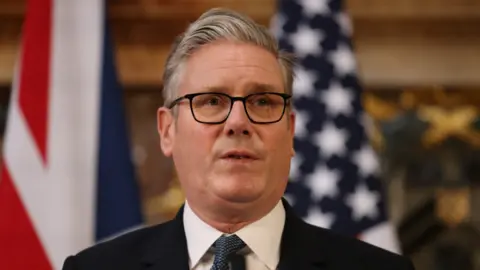
This post was originally published on this site.
Sir Keir Starmer is expected to announce plans for a compulsory UK-wide digital ID scheme in a speech on Friday.
The prime minister believes it would help crack down on illegal working and modernise the state, according to senior figures in government.
The practicalities of the scheme will be subject to a consultation, which will also look at how to make it work for those without a smartphone or passport.
The previous Labour government’s attempt to introduce ID cards was ultimately blocked by the Conservative-Liberal Democrat coalition.
But earlier this month, Sir Keir said in an interview he thought the debate had “moved on” since then.
“We all carry a lot more digital ID now than we did 20 years ago, and I think that psychologically, it plays a different part,” he added.
Reports have suggested the government plans to use a new scheme to check people’s right to live and work in the UK, with people’s individual ID checked against a central database.
These checks are currently based on physical documents, although routes to complete the checks online for some people have existed since 2022.
The government last year rejected a digital ID proposal suggested by former Labour Prime Minister Sir Tony Blair.
But in recent weeks ministers have warmed to the idea, as they have come under increasing pressure to tackle illegal migration.
Cabinet Office minister Pat McFadden has also talked about the scheme’s potential to improve access to government services.
He recently visited Estonia, where digital identity can be used to access services such as medical records, voting and banking.
‘Cynical ploy’
Conservative leader Kemi Badenoch has expressed scepticism that digital ID would help to tackle illegal migration.
After the prime minister said earlier this month that officials were examining a scheme, she said it was “not really going to solve the problem”.
Reform UK has denounced the plan as a “cynical ploy to fool voters that something is being done about illegal immigration”.
“It’s laughable that those already breaking immigration law will suddenly comply, or that digital IDs will have any impact on illegal work,” the party added.
“All it will do is impinge further on the freedoms of law-abiding Brits.”
The Liberal Democrats played a central role in blocking the previous Labour government’s ID cards.
But leader Sir Ed Davey told the party’s conference earlier this week the party should look at the issue again, and not be “knee-jerk” in its opposition.
Online checks
Employers already have to check that prospective candidates have the right to work in the UK.
Since 2022, they have been able to carry out checks on passport-holding British and Irish citizens by using digital verification services that have been certified by the government.
A Home Office online scheme also exists to verify the status of some non-British or Irish citizens, whose immigration status is held electronically.
It is understood officials have been looking at whether requiring a digital ID could provide a more consistent approach to verifying identity.
They are also thought to be exploring whether the scheme could reduce the use of fake documents, and make it easier to target enforcement activity.
-
Culture2 days ago
Taylor Swift’s new cinema outing generates more than €12million in just 24 hours
-
Politics2 days ago
European Parliament snubs Orbán with vote to shield Italian MEP from Hungarian arrest
-
Culture2 weeks ago
Life, loss, fame & family – the IFI Documentary Festival in focus
-
Health3 days ago
EU renews support for WHO’s Universal Health Coverage Partnership
-
Culture2 months ago
Fatal, flashy and indecent – the movies of Adrian Lyne revisited
-
Culture2 days ago
Twilight at 20: the many afterlives of Stephenie Meyer’s vampires
-
Environment6 days ago
Key oceans treaty crosses threshold to come into force
-
Culture1 week ago
Farewell, Sundance – how Robert Redford changed cinema forever



